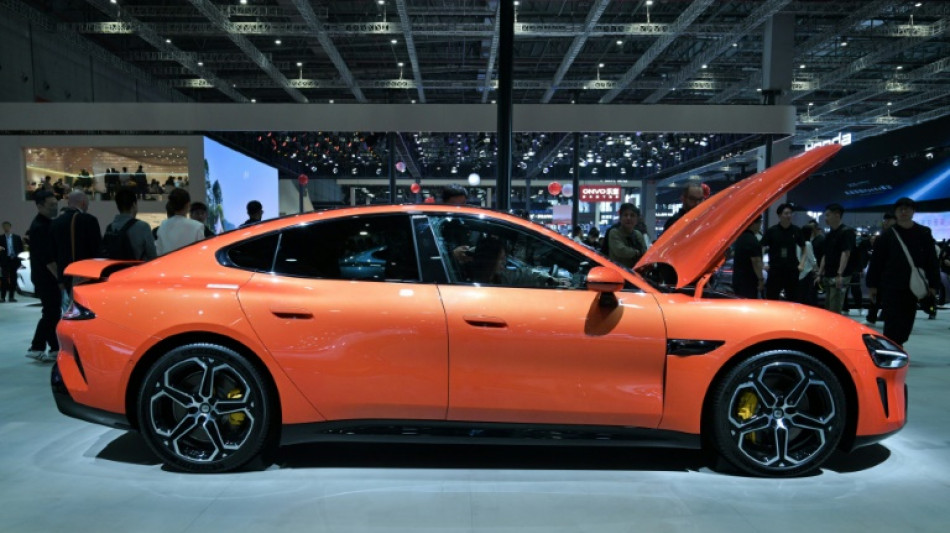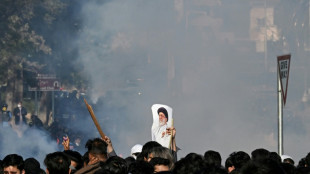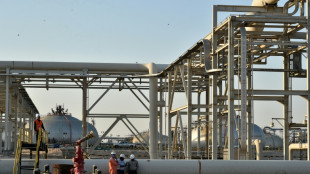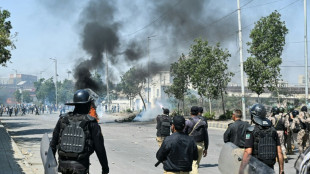
-
 Dortmund captain Can out for season with ACL tear
Dortmund captain Can out for season with ACL tear
-
Leweling doubles up as Stuttgart sink sorry Wolfsburg

-
 Man Utd climb to third, Fulham sink sorry Spurs
Man Utd climb to third, Fulham sink sorry Spurs
-
Iran strikes send VIP Dubai influencers 'back to reality'

-
 Briton Brennan bursts to Kuurne-Bruxelles-Kuurne triumph
Briton Brennan bursts to Kuurne-Bruxelles-Kuurne triumph
-
Activists pressure Milan Fashion Week to go fully fur-free

-
 Blasts in Kabul as Afghan govt says responding to Pakistan attacks
Blasts in Kabul as Afghan govt says responding to Pakistan attacks
-
Iranians grieve, celebrate, worry after Khamenei's killing

-
 Latest developments as Iran lashes out after US-Israel strikes kill Khamenei
Latest developments as Iran lashes out after US-Israel strikes kill Khamenei
-
West Indies post 195-4 against India in T20 World Cup do-or-die clash

-
 South Africa 'embrace pressure' and favourites tag, says coach
South Africa 'embrace pressure' and favourites tag, says coach
-
Tel Aviv residents say ready to withstand more Iranian attacks

-
 Russia loses key ally leader as Putin slams Khamenei 'cynical' killing
Russia loses key ally leader as Putin slams Khamenei 'cynical' killing
-
AC Milan consolidate top-four credentials with win at Cremonese

-
 Flights of fancy at Bottega Veneta, atmospheric mood at Armani in Milan
Flights of fancy at Bottega Veneta, atmospheric mood at Armani in Milan
-
Guardiola calls for respect after Ramadan break is booed

-
 Afghanistan warns Iran war will impact whole region
Afghanistan warns Iran war will impact whole region
-
Iran launches fresh strikes across Gulf after vowing revenge for slain leader

-
 OPEC+ hikes oil production by more than expected following outbreak of Iran war
OPEC+ hikes oil production by more than expected following outbreak of Iran war
-
Goggia tightens grip on World Cup super-G with victory in Andorra

-
 Belgium seizes Russian 'shadow fleet' tanker
Belgium seizes Russian 'shadow fleet' tanker
-
Raza steers Zimbabwe to 153-7 against South Africa

-
 Kerr on target as Australia make winning start to Women's Asian Cup
Kerr on target as Australia make winning start to Women's Asian Cup
-
Marquez says 'unlucky' to retire from MotoGP season opener

-
 9 killed in pro-Iran protest at US consulate in Pakistan's Karachi
9 killed in pro-Iran protest at US consulate in Pakistan's Karachi
-
Green clinches Singapore title with help from caddie husband

-
 More flights cancelled as Iran conflict shuts Mideast hubs
More flights cancelled as Iran conflict shuts Mideast hubs
-
'One Battle After Another' wins top producer award before Oscars

-
 Iran vows revenge for slain supreme leader despite Trump threat
Iran vows revenge for slain supreme leader despite Trump threat
-
Flights of fancy at Bottega Veneta with shimmering, tactile collection

-
 World Cup marks 100-day countdown amid political upheaval
World Cup marks 100-day countdown amid political upheaval
-
Bezzecchi wins MotoGP opener as Marquez retires

-
 Pro-Iran protesters try to storm US missions in Pakistan, Iraq
Pro-Iran protesters try to storm US missions in Pakistan, Iraq
-
8 killed in pro-Iran protest at US consulate in Pakistan's Karachi

-
 Latest developments after US, Israeli strikes kill Iran's Khamenei
Latest developments after US, Israeli strikes kill Iran's Khamenei
-
Before dawn, ancient drum rite wakes Istanbul faithful to fast

-
 Music, mourning as Iran's Khamenei is killed
Music, mourning as Iran's Khamenei is killed
-
Pakistan cricket's lack of T20 evolution exposed by World Cup exit

-
 Cobolli downs Tiafoe to claim Mexican Open
Cobolli downs Tiafoe to claim Mexican Open
-
Takele defends Tokyo Marathon title after sprint finish

-
 Hollywood's finest gather for guild's Actor Awards
Hollywood's finest gather for guild's Actor Awards
-
Iran prepare for Women's Asian Cup as bombs drop on homeland

-
 Doncic shines as Lakers cruise past depleted Warriors
Doncic shines as Lakers cruise past depleted Warriors
-
3D tool Unreal Engine makes real impact in creative industries

-
 OPEC+ mulls oil production increase in shadow of war
OPEC+ mulls oil production increase in shadow of war
-
Putin, Russia's eternal leader defined by war and power

-
 Explosion, gunfire as Afghan forces shoot at aircraft over Kabul
Explosion, gunfire as Afghan forces shoot at aircraft over Kabul
-
Iranians across North America rally for -- and against -- strikes

-
 Shakespeare would have shunned streaming, 'Hamnet' team says
Shakespeare would have shunned streaming, 'Hamnet' team says
-
Will Oscars be 17th time lucky for songwriter Diane Warren?


Smart driving new front in China car wars despite fatal crash
Intelligent driving features are the new battleground in China's merciless car market, with competition spurring brands to world-leading advances -- but a recent fatal crash has seen the government intervene to put the brakes on runaway enthusiasm.
Advanced driver-assistance systems (ADAS) help with tasks ranging from cruise control to parking and collision avoidance, with the ultimate aim being a fully self-driving car.
Automakers are pouring investment into their development, especially in the world's biggest car market China, which skews young and tech-savvy.
"Ten years ago, only 15 percent of customers said they would change car because of an intelligent cockpit -- today it's 54 percent," Giovanni Lanfranchi of EV firm Zeekr said.
Almost 60 percent of cars sold in China last year had level-two ADAS features -- where the driver is still in control but there is continuous assistance -- or above, according to an AlixPartners report released last week.
The features "are emerging as a key competitive tool", said the consultancy's Yvette Zhang.
Some firms use their own proprietary technology, like start-up Xpeng and consumer electronics-turned-car company Xiaomi, while others are cooperating with tech giants such as Huawei.
Such software is being developed in Europe and North America too.
But in a survey of hundreds of global auto executives surveyed by AlixPartners, two-thirds said they believed China led the world in the field.
"The collection and processing of data, and the availability of software and machine-learning talent" is difficult to replicate, the report said.
The technology is not immune from the price wars that are a key feature of the Chinese market.
In February, domestic EV giant BYD announced it would release its "God's Eye" driving system on nearly all its cars, including on some models priced below $10,000.
- Over-promising? -
Then came a fatal accident in March involving a Xiaomi SU7 that had been in assisted driving mode just before it crashed.
The accident, in which three college students died, raised concerns over safety and the advertising of cars as being capable of "autonomous driving".
The issue is an industry-wide one -- Tesla's US-released "Full Self-Driving" capability, for example, is still meant to be used under driver supervision.
"The price war has just been so brutal, companies are desperate to find any way to set themselves apart," said Tom Nunlist, associate director for tech and data policy at Trivium China.
"So the question is have they been over-promising on features and releasing things as quickly as possible, for the purposes of fighting this commercial battle."
China's Ministry of Industry and Information Technology seems to share those concerns.
After the crash, it held a meeting with leading automakers and other key players in which it made clear that safety rules would be more tightly enforced.
It warned automakers to test systems rigorously, "define system functional boundaries... and refrain from exaggerated or false advertising".
Reports said it will also crack down on the practice of improving ADAS via remote software updates.
- 'Sharp U-turn' -
As the massive industry show Auto Shanghai kicked off last week, the shift in gear was obvious.
"In a sharp U-turn from just two months ago, carmakers have taken a low profile in terms of autonomous driving functions, but are emphasising safety instead," said UBS' Paul Gong in a note.
"Safety is the ultimate premium of new energy vehicles," a sign at BYD's booth read.
At the bustling Xiaomi booth, information boards touted the SU7's colour choices, chassis and hardware -- but AFP saw no mention of ADAS at all.
"The autonomous driving function marketing race seems to have halted, at least temporarily," wrote Gong.
Zhang Yu, managing director of Shanghai-based consultancy Automotive Foresight, told AFP that he thought the crash was "only a setback in marketing terms, which is helpful for a healthy development" of the area.
"This accident was not related to tech or the system itself, it more concerns the ignorance of ADAS and boundary of autonomous driving," he added.
The technology itself continues to progress.
"That's why this is becoming a pressing issue because car companies are going to be wanting to release these features," Trivium's Nunlist said.
However, a truly autonomous car -- level five on the scale -- is "certainly not imminent", he added, predicting "very hard last-mile problems".
H.E.Young--AMWN


